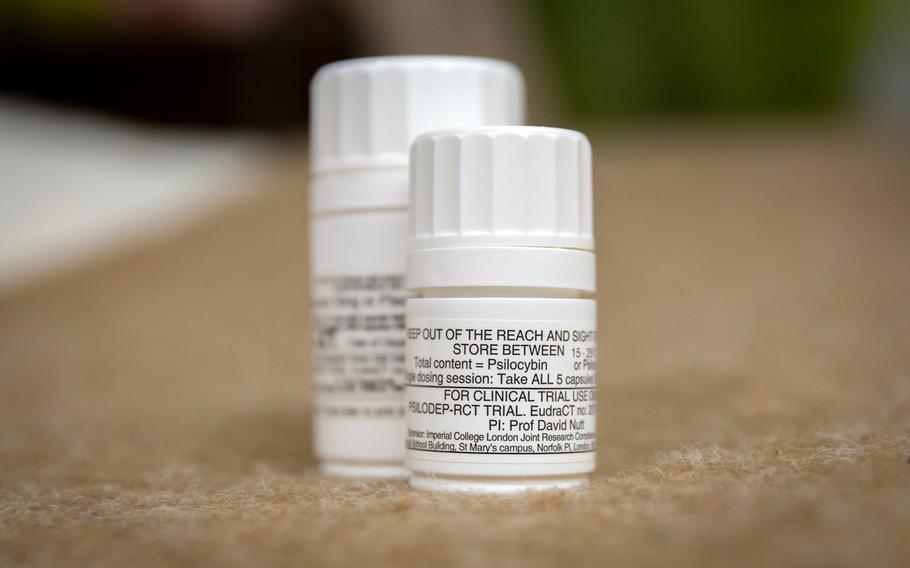
The military will conduct research and clinical trials to determine whether psychedelic drugs, such as these psilocybin capsules, can treat service members suffering from post-traumatic stress disorder and traumatic brain injury under provisions of the defense spending bill approved by Congress last week. (Thomas Angus/Imperial College London)
WASHINGTON — The military will conduct research and clinical trials to determine whether cannabis, magic mushrooms and other psychedelic drugs can treat service members suffering from post-traumatic stress disorder and traumatic brain injury under provisions of the defense spending bill approved by Congress last week.
Section 723 of the National Defense Authorization Act, which received final Congressional approval Friday, provides $10 million in research grants for psychedelic-assisted therapies and for “qualified” plant-based alternative therapies that include cannabis.
Medical cannabis is legal in 38 states, the District of Columbia and three U.S. territories but remains illegal under federal law. Language in the legislation states that service members can participate in the clinical trials without breaking the law.
The provision in the NDAA, which specifies spending guidance for the Defense Department during the current fiscal year, was spearheaded by three retired military officers — Rep. Dan Crenshaw, R-Texas, a former Navy SEAL; Rep. Morgan Luttrell, R-Texas, also a former SEAL; and Rep. Jack Bergman, R-MI, a retired Marine Corps lieutenant general.
Luttrell suffered a traumatic brain injury, or TBI, in a Black Hawk helicopter crash in 2009. He credits psychedelic-assisted therapy outside the U.S. after his medical discharge with saving his marriage and changing his life.
Under the legislation, the Defense Department will award research grants to universities and government agencies to conduct the tests. Service members with certain medical conditions must receive permission to undertake the medically administered therapies in controlled clinical settings.
Veterans’ groups such as Special Operations Association of America have expressed support for the legislation. Limited studies show a decrease in depression, anxiety and stress among users of certain psychedelic drugs.
David Cook, the executive director, said he knows of SOAA members who received psychedelic-assisted medical therapies and had positive outcomes.
“The results, though small in sample size, have been nothing short of miraculous,” Cook said in an interview with Stars and Stripes.
He described the legislation as a life-or-death issue for many veterans experiencing PTSD and the effects of TBI.
“What’s been proposed and implemented in the past is obviously not working today,” he said. “Legislation like this aims to give our heroes more options and hope for life-saving treatments.”
Clinics participating in the study must report their findings to Congress, including the medical conditions treated, outcomes and whether active personnel returned to full duty. Large doses of one of the drugs to be tested, ibogaine, have led to serious cardiovascular problems and death.
Nevertheless, Cook said that SOAA members have been encouraged by greater attention in Congress to pursuing alternative treatments for PTSD and TBI.
“Those of us who are serious about the suicide epidemic gripping our service members and veterans have to pivot in our thinking and approaches to these issues,” Cook said.